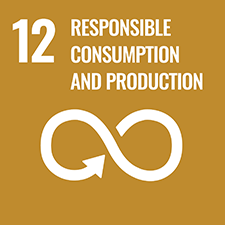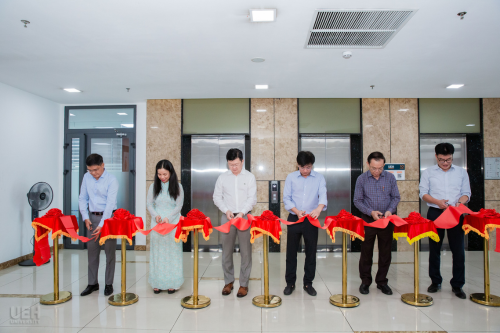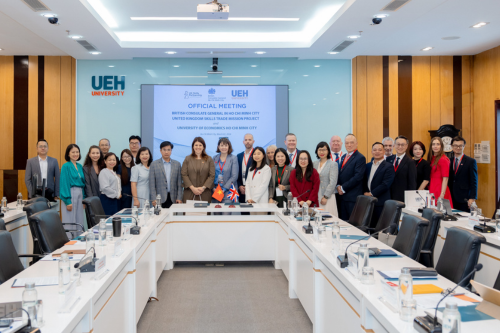UEH to be ready with a new vision and strategy: Becoming a Multidisciplinary and Sustainable University in the Top 250 Asia in the 2025 – 2030 period
06 Feb, 2025
With the motto of "continuous innovation to pioneer," in accordance with their achievements over the past 48 years, University of Economics Ho Chi Minh City (UEH) has soon started planning a strategy for their new vision of "becoming a Multidisciplinary and Sustainable University in the Top 250 Asia in 2025 - 2030, aiming for the Top 150 Asia between 2030 and 2045."
Choosing to operate according to a modern university governance model, UEH considers "proactive strategic planning" as a driving force for sustainable development. Accordingly, short, medium and long-term strategies and plans are regularly planned according to the principle of Plan - Do - Check - Act to ensure that they are up-to-date, pioneering, consistent with internal capacity, future expectations and the constant changes of the times.
In 2024, UEH completed their vision early by entering the Top 501-600 World Universities (according to THE 2025 Ranking), officially included in the group of the world's leading universities. This resulted from the comprehensive internal strength of each individual and unit under UEH that has been accumulated over 48 years of formation and development.
With the spirit of "continuous innovation to pioneer", a new vision has been considered and selected by the Board of Management to become a common guideline for the collective UEHer to look forward to becoming a multidisciplinary and sustainable university in the Top 250 Asia in the period 2025 - 2030, aiming for the Top 100 Asia in the period 2030-2045.
Accordingly, in the international market, UEH is expected to become a multidisciplinary university with leading prestige in the Asian region, taking their strengths in Economics, Business and Management as a foundation to integrate with the fields of Technology, Design, etc. Domestically, UEH will continue to rise to become a key public higher education institution in Vietnam, leading higher education institutions in the Southern region to carry out four missions: (1) Providing high-quality human resources, (2) Transferring global knowledge, (3) Promoting innovation, and (4) Pioneering action, inspiring sustainable development.
To realize the new vision and mission, the detailed goals, strategies and action solutions according to 5 strategic pillars (Training, Research, Operation, Administration and Community Connection) have been planned according to 3 groups of criteria: (1) Ensuring international quality, (2) Expanding university space, (3) Strengthening connection and sharing.
Training & Research: Ensuring international quality
UEH's internationalization strategy is not only constrained to the standards for assessing the quality of training programs or the ranking of scientific publications in the international academia but also rooted in learning and approaching the practices of the world's leading universities. That is to place the role of a university in the sustainable development of the locality, region and the world. Accordingly, UEH deploys the Glo-cal knowledge platform: applying multidisciplinary, interdisciplinary, and transdisciplinary knowledge, closely linked to the times in training and research as a basis for joining hands to solve global and local multi-level issues.
* Training global citizens, acting for sustainable development
UEH will upgrade the quality of training linked to the internationalization through 3 groups of solutions including:
1) Innovating, internationalizing and enhancing the practicality of training programs. UEH will innovate teaching and assessment content; increase English-language courses and programs; review and develop input and output standards for training programs according to the common standards of leading schools in the region; conduct international accreditation and promote recognition of courses by leading schools in the region and prestigious professional associations; continue to focus on developing multidisciplinary, interdisciplinary training programs, integrating sustainable development goals (SDGs); develop policies to encourage classes to apply teaching methods to create unique learning experiences; enhance training cooperation and student exchange with leading universities; develop lectures, textbooks, electronic learning materials, online courses to serve training at all levels/systems; increase lectures shared with the community, and gradually deploy a shared digital university model.

(2) Strengthening capacity and developing the team, focusing on attracting international talents. UEH will build a recruitment and talent management brand; develop policies to promote and to facilitate lecturers and researchers to participate in domestic and international networks, forums and organizations; to promote training and fostering management skills for the next generation of managers and senior staff; to arrange and to plan staff with sufficient capacity, qualifications, innovative thinking, creativity and prestige to train, to foster, to rotate, and to create a good source of staff; to continue to complete and to promote the implementation of the job project, to optimize the team towards streamlining and efficiency; to strengthen training and fostering to improve skills; to continue to improve working conditions, regulations on workplace standards according to qualifications and titles, ensuring that each staff has a private working space suitable for job requirements and assigned tasks.

3) Developing a plan to enhance UEH's recognition in the international community, in conjunction with UEH Global Hub. Accordingly, UEH will continue to complete English-language training programs at all levels; complete international scholarship policies, procedures for receiving, supporting and caring for international students; complete multilingual websites/information channels to easily reach international students; strengthen cooperation with leading universities in the region, educational institutions and embassies; connect international students for business semesters of multinational companies/corporations with branches in Vietnam; implement international communication and promotion, build and form a network of international partners, with exhibitions in Southeast Asian and Asian countries.

*Research for the community
As a pillar of UEH's internationalization strategy for many years, research activities at UEH aim to contribute knowledge to global academia as a foundation to ensure solid & in-depth knowledge for the training pillar. In the upcoming period, UEH will implement the following solutions:
1) Promote international cooperation and build an ecosystem in research. UEH will build a multilateral "co-creation" research ecosystem, develop a "green" researcher community, promote global academic partnerships and international organizations; connect the community and social responsibility through the establishment of international consulting groups; and build projects to seek funding sources and technology transfer partners.
2) Encourage international publications and enhance academic reputation. UEH continues to promote incentive mechanisms, maintain the quantity and quality of research in international publications in the prescribed list; continue to orient topics, establish strong research groups, encourage schools/institutes to participate in international publications related to SDGs; create all conditions to promote the development of the Journal of Asian Business and Economic Studies (JABES); continue to invest in database systems serving scientific research.
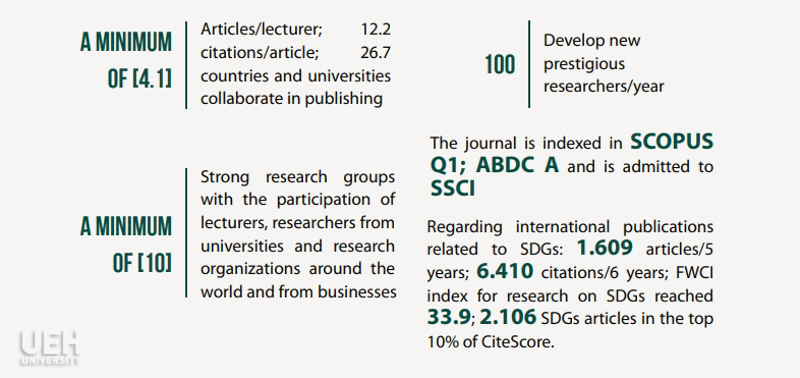
(3) Make UEH a place to gather and to connect the global community of researchers and academics. Accordingly, UEH will develop cooperation with leading universities in the region in each stage; promote the role of UEH in international activities, forums and organizations; expand the network and improve the quality of activities of international research collaborators and scholars associated with UEH; standardize the scientific information database of domestic and international lecturers and researchers; perfect regulations and policies to encourage the formation of intellectual property such as copyright, patents, etc.; create conditions to promote the commercialization of scientific and technological activities and products; forming an intermediary platform connecting supply and demand for products, scientific and technological research results, developing applied research, etc.
Operation & Administration: Expanding university space, prioritizing digital, green and sustainable academic campuses
*Modern university administration following the model of new-generation universities
UEH will prioritize university administration solutions including:
1) Modernizing technical infrastructure and facilities, expanding UEH space according to international standards on par with the region. Accordingly, UEH will upgrade and expand campus A to a smart university center connecting international education in Ho Chi Minh City. Campus N will become a green, carbon-neutral campus, owning a university park connecting with the community. The branch in Nha Trang will become UEH Global Hub; renovate the branch in Vinh Long, Nguyen Trung Truc campus 1 and complete Long Ho campus 2 in the direction of a university campus adapting to climate change.
2) Improving effective management capacity based on technological advances and digital transformation. UEH will improve the digital communication environment; digitize the experience of the learning and working environment at UEH; continue to implement digital transformation in management; enhance digital communication of scientific research results, technology development, promote scientific and applied research, and international cooperation; develop the UEHer network, improve external partnerships and the experience of alumni and partners.
3) Improving the university brand communication capacity by strengthening & standardizing communication platforms; implementing communication strategies to position the training and academic research brand to create differentiation focusing on recruitment and internal engagement communication.
4) Improving the readiness to comprehensively systematize rankings, building a database of continuously updated rankings, standardizing data submission, and focusing on analyzing annual ranking results as input for strategies and action plans.
5) Developing a financial and sustainable plan including identifying financial sources (other than tuition fees); developing a methodical plan to diversify revenue sources; increasing revenue sources from training, research, consulting services, technology transfer, and startups suitable for the university environment; diversifying revenue sources through short-term training activities, maximizing the potential of campus location, infrastructure, professional capacity, and financial leasing; promoting cooperation with businesses, attracting investment from businesses for science, technology, and consulting activities; effectively mobilizing resources in the UEH alumni community.
*Operation “From green campus to carbon neutral and happy university”
UEH sustainably operates campuses minimizing the impact of climate change and creating positive impacts on the “health” of campuses, communities and regions through solutions including:
1) Continue to implement and to complete the Living Lab UEH Green Campus project, the Circular Campus phase includes focusing on implementing sustainable purchasing policies, Net Zero commitments, energy efficiency policies, on-site renewable energy policies, roadmap to achieve Net Zero goals; operating the university campuses according to the “Circular campus” model; standardize and disseminate projects and successful initiatives to the community; multilaterally connect through project activities and initiatives; and connect with international and non-governmental organizations to implement the project.
2) Building an organizational culture - Diversity, Equity and Inclusion (DEI) university. A happy university includes reviewing and building a clear, detailed, inspiring, and directional UEH cultural model, along with policies associated with the happy university model, DEI; strengthening the implementation of courses on multiculturalism, globalization, and topics related to social equality; promoting research on DEI and happy university; continuing to build facilities to serve equality, diversity, and inclusion; communicating and spreading UEH culture; strengthening gender equality programs through the construction of personalized facilities for women; UEH's own policies (in addition to the government’s regulations) for lecturers, civil servants, female employees and students, recruitment, reward, and priority planning policies for female and managers.
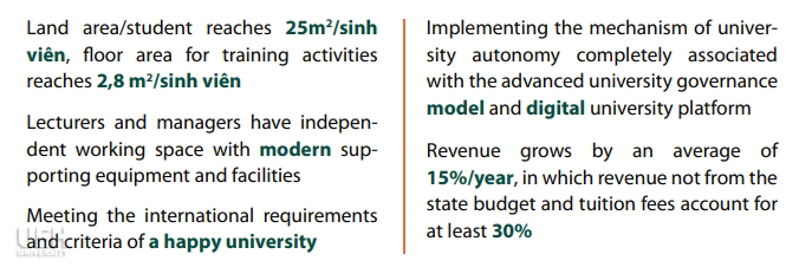
Community connection: Strengthening connection and sharing
UEH will be the center for connecting the community to take sustainable action and inspire art through the following solutions:
1) Building a foundation of sustainable cooperation and co-creation with businesses and professional organizations; specifically, continue to complete the overall and detailed program of "Connecting the community - Spreading knowledge - Sustainable action"; increase private funding through research investment funds; initiate periodic forums connecting businesses and universities in Vietnam, Southeast Asia, and Asia; proactively participate and become members of international professional associations in Vietnam; continue to build and create joint social responsibility programs with businesses; establish an advisory board from businesses to contribute ideas on strategies for developing training, research, and startup programs, participate in teaching, organize experience sharing sessions or mentor projects.
2) Become a "City University Hub" in Ho Chi Minh City, Vinh Long, and Nha Trang in connection with local authorities. UEH will build Living Labs connecting stakeholders to solve economic, social, and environmental issues in a sustainable manner locally; Develop a plan to implement signing and comprehensive cooperation with localities through developing research projects, policy consulting, transferring research and scientific and technological products; complete UEH Global project products connecting the network of high schools nationwide through transferring knowledge on sustainability and STEM for local youth communities; proactively organize and co-chair with local authorities to organize multilateral workshops to solve local sustainability issues; disseminate and replicate lessons from the UEH Green Campus project in a wider scope.
3) Strengthen the role of knowledge transfer of Institutes and Centers under/affiliated with UEH/Member Colleges. UEH aims to develop UEH-affiliated institutes/member colleges based on the strengths of each unit to become leading units in research, consulting, and transferring issues such as sustainable development, green economy, circular economy, digital economy, sharing economy, science - technology - innovation; encourage units to increase free training programs for the community, free training courses/knowledge channels on sustainability for the community, etc.
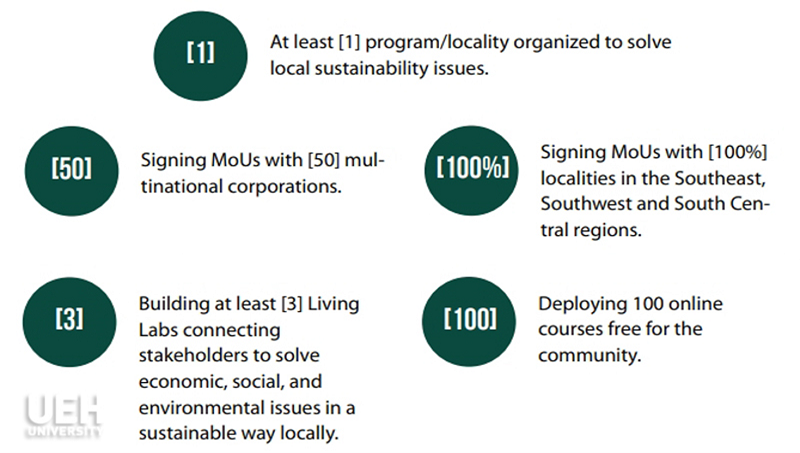
4) Promotion of innovation and entrepreneurship includes enhancing instruction, training, and fostering knowledge of innovation and entrepreneurship for officials, lecturers, students, and business-support organizations; continuing to improve the quality of information-providing and communications channels, and the awareness of UEH officials, lecturers, and students on innovation and entrepreneurship; developing a multi-object start-up network associated with stakeholders; building UEH facilities and the mechanism for investment and support of entrepreneurship; and completing recruitment programs and incubation for long-term development of start-ups, and investment-attracting mechanism socialized from resources for funding for innovation and entrepreneurship.
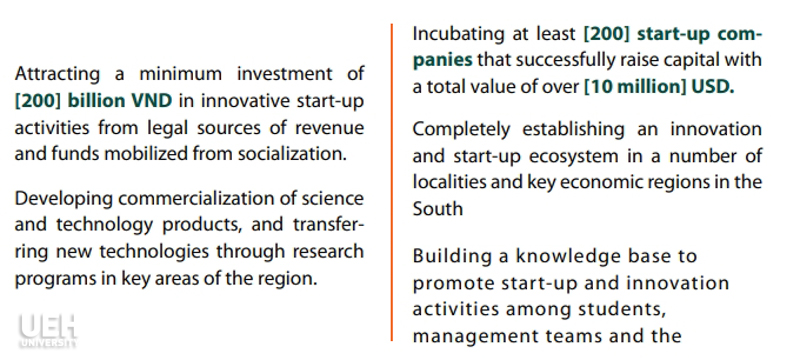
The achievements UEH has obtained in the past 48 years have upgraded UEH to become one of the "key" multidisciplinary universities in the field of higher education in Vietnam; concurrently, to write the story of a university in Vietnam reaching international standards. This will be a solid foundation for a "new" UEH in the 2025-2030 period, with a vision to 2035, to fulfill its mission: to affirm the differentiation of the UEH brand domestically and the recognition of its academic reputation internationally - a Multidisciplinary and Sustainable University in the Top 250 Asia in the 2025-2030 period aiming for the Top 150 Asia in the 2030-2045 period.
News and photos: Assoc.Prof.Dr. Bui Quang Hung - Vice President of UEH


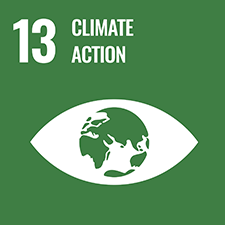



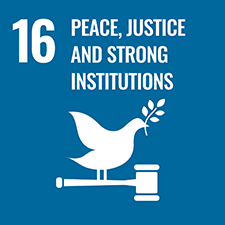
![[Research Contribution] Modernizing and Elevating Vietnamese Higher Education: Creating Breakthroughs in High-Caliber Human Resource Development and Talent Cultivation, Leading Research and Innovation](/images/upload/thumbnail/ueh-thumbnail-639083193174001549.png)
![[Research Contribution] Sustainable Manufacturing: A Driving Force for the Green Economy and the Challenges Ahead](/images/upload/thumbnail/ueh-thumbnail-639082294182922007.png)
